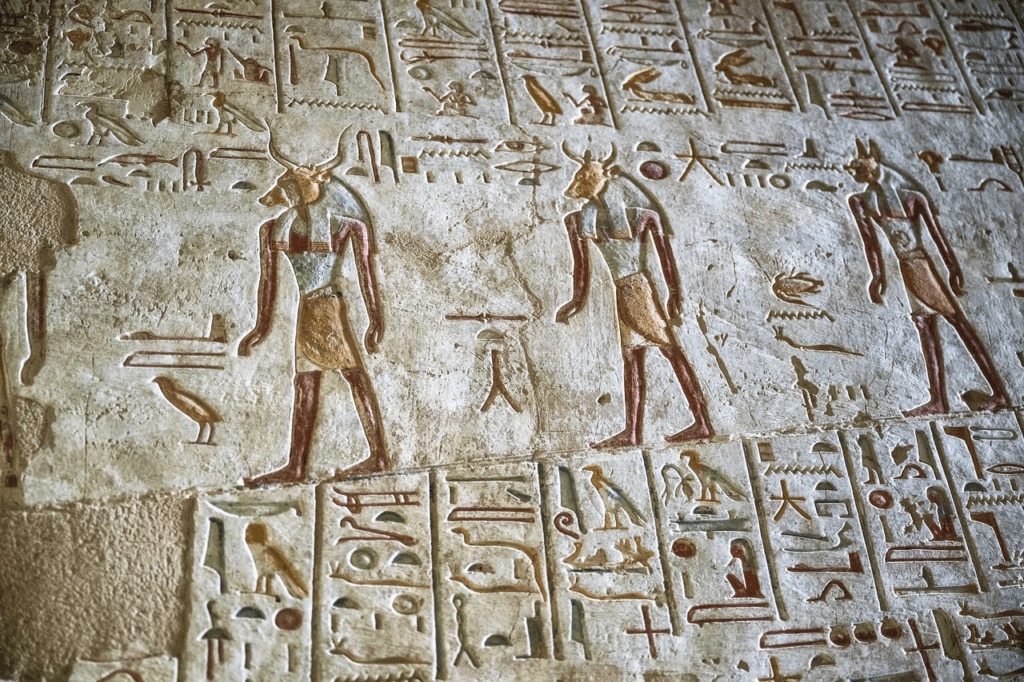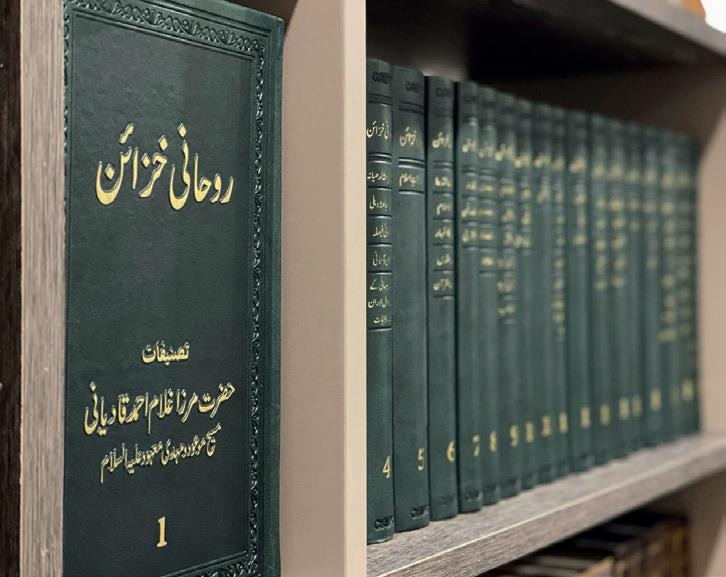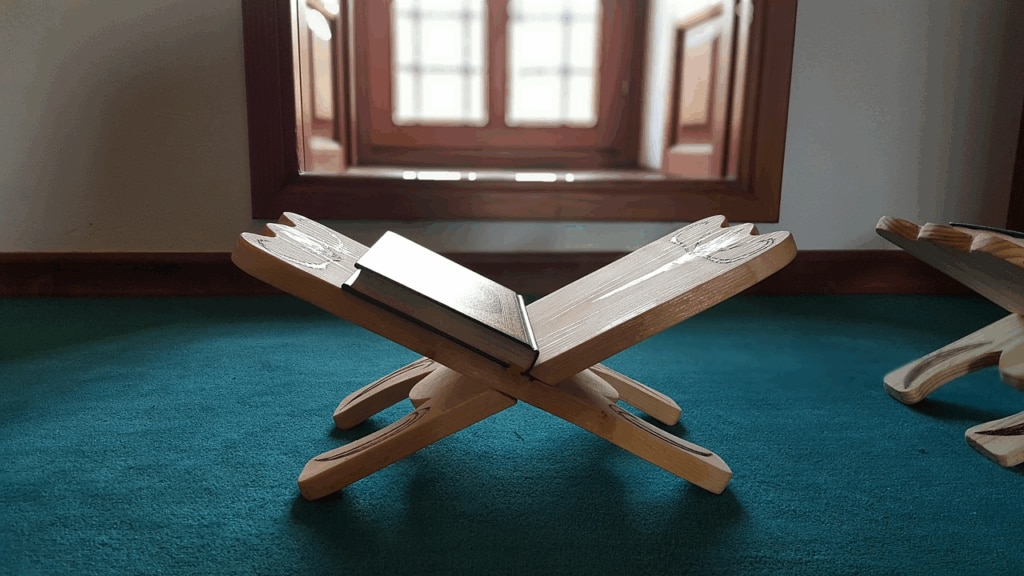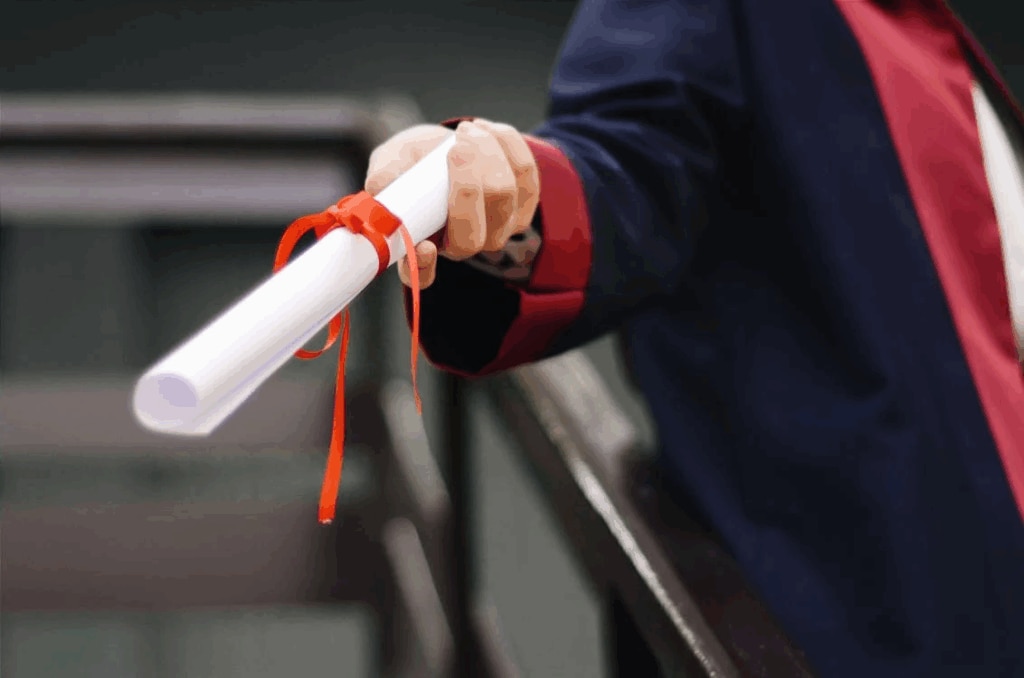Guidance regarding basic Islamic issues that Hazrat Amirul Momineen, Khalifatul Masih Vaa, has given on various occasions in his written correspondence and during MTA programmes is being published officially below for everyone’s benefit.
What is the meaning of ‘cutting hands’ as mentioned in Surah Yusuf?

A lady from the UK enquired of Hazrat Amirul Momineen, Khalifatul Masih Vaa, that “In Surah Yusuf, it is mentioned that the wife of Prophet Joseph’sas master placed knives in the hands of the women. Hazrat Khalifatul Masih IVrh wrote in a commentary note that these women found Prophet Josephas beyond the reach of their hands; they did not cut their hands. The question is, why did the wife of the Aziz of Egypt place knives in their hands?”
In his letter dated 7 July 2023, Huzoor-e-Anwaraa gave the following reply to this question:
“The Aziz of Egypt was among the nobles of the empire and the feast in his house was certainly no ordinary gathering; it must have been a very opulent feast. Therefore, the finest arrangements for dining would have been made according to the standards of that era, in which knives and forks would have been laid out for eating, or knives would have been placed before the guests for peeling fruit and the like. Accordingly, Hazrat Khalifatul Masih Ira, in his commentary on this verse, translating the word sikkin, states:
“‘Sikkinan: A knife. For peeling fruit.’ (Haqaiq-ul-Furqan, Vol. 2, p. 392)
“Hazrat Musleh-e-Maudra, explaining the reason for the knives being present, states:
“‘She invited them to a meal or breakfast. A table was laid out and a knife was placed before each of them. (From this, it is known that the use of knives in dining has been a practice since ancient times and it was also a custom, as it is today, that the knives were laid out first and then the food items would arrive).’ (Tafsir-e-Kabir, Vol. 3, Qadian: 2004, p. 307)
“Thus, the wife of the Aziz of Egypt, in keeping with her status, arranged the finest feast for her friends, in which she also provided knives for peeling fruit and other delicacies.
“Regarding the words of the verse that they ‘cut their hands’, I should also mention that both types of explanations for this are present in the Jamaat’s literature. One meaning of cutting their hands is that upon seeing Prophet Josephas, on account of his piety and nobility, in a state of rapt absorption and out of astonishment, they bit their own fingers between their teeth and, due to his piety and nobility, found him beyond the reach of their nefarious intentions. And it is also correct that, due to the awe-inspiring power of Prophet Joseph’sas beauty, in a state of astonishment, they cut their hands instead of the fruit. Accordingly, the Promised Messiahas writes:
“‘And it was that very effect of rapt absorption that caused the companions of Zulaikha to cut their fingers.’ (Maktubat-e-Ahmad, Vol. 1, p. 594)
“Hazrat Khalifatul Masih Ira states in this regard:
“‘قَطَّعْنَ أَيْدِيَهُنَّ: This is an idiom; it means they expressed wonder and, out of astonishment, bit their hand in their mouth. Some have taken it to mean that due to wonder, the awe of his beauty and being utterly captivated, they cut their hands instead of the fruit.’ (Appendix to Badr, Qadian, No. 10, Vol. 9, 30 December 1909, p. 130)
“Hazrat Musleh-e-Maudra has translated this verse in Tafsir-e-Saghir as follows:
“‘When they beheld him, they esteemed him highly and in wonderment pressed their fingers between their teeth and exclaimed: He has resisted evil for fear of Allah: He is superhuman; he must be a noble angel.’ (Tafsir-e-Saghir, p. 293 and footnote)
“Similarly, in his commentary on this verse in Tafsir-e-Kabir, he states:
“‘As for the statement that they cut their hands, it can have two meanings. One is that they were so engrossed in the sight of his innocence and nobility that the hands of some of them were injured by the knives. And it can also mean that they bit their fingers between their teeth in astonishment, as if to say, ‘How could we speak of such a person in this manner?’ Accordingly, in Arabic, the idiom ‘adda l-anamila – to bite one’s fingertips – is indeed used to express astonishment. Furthermore, it is a feature of Arabic rhetoric that the whole is sometimes used to denote a part. It is possible, therefore, that the word aydia [hands] was used here in place of anamila [fingertips].
“‘In the Talmud, which is the book of Jewish traditions, it is written that the wife of Potiphar had placed citrons before these women and had instructed them to be served. They kept gazing at him and, in their inattentiveness, injured their hands. [Midrash Tanhuma, Vayeshev 8]’ (Tafsir-e-Kabir, Vol. 3, Qadian: 2004, p. 307)
“Therefore, both interpretations of the phrase ‘cutting their hands’ are correct, based on idiomatic usage and different meanings according to the context.”
How do Islamic teachings explain the Sun’s ‘circuit’ and the Earth’s orbit?

Someone wrote to Hazrat Amirul Momineen, Khalifatul Masih Vaa: “The Promised Messiahas has written in Chashma-e-Ma‘rifat that ‘the Sun completes its cycle in 364 days’. However, we have always heard that the Earth takes approximately 364 days to circle the Sun. I request guidance on this matter.”
In his letter dated 7 July 2023, Huzoor-e-Anwaraa gave the following reply to this question:
“The Promised Messiahas has certainly not stated that the Sun revolves around the Earth. Rather, he stated that the Sun completes its circuit and that circuit is undoubtedly fulfilled by the Earth’s revolution around the Sun. This is precisely what the Promised Messiahas meant: that when the Earth revolves around the Sun, this apparent annual cycle of the Sun is completed in 364 days.
“Furthermore, it is this solar cycle that causes the change in seasons and the orientation of the Sun in summer and winter also differs for this reason. Accordingly, the Promised Messiahas also states at another place on this matter:
“‘And He has subjected to you the Sun and the Moon, both ever-revolving’: That is, they do not remain in one state with respect to their qualities and properties. For example, the property of the Sun in the months of spring is by no means the same as in the months of autumn. Thus, in this way, the Sun and the Moon are ever-revolving. Sometimes, from their motion, the season of spring arrives and at other times, autumn. And sometimes, one particular type of property manifests through them and at other times, its opposite properties appear.’ (Tauzih-e-Maram, Ruhani Khazain, Vol. 3, p. 75)
“The second point to bear in mind is that the Promised Messiahas is speaking here in accordance with the apparent celestial motion as perceived from Earth, a perspective tailored to the understanding of an ordinary person. From our terrestrial viewpoint, we observe the Sun rising on one horizon and setting on the other. An observer who perceives themselves as stationary on the Earth naturally concludes that the Sun is revolving around us. It is in this phenomenological context that the Promised Messiahas used this illustration to explain his point to a general audience. The actual subject he is explaining at this point in Chashma-e-Ma‘rifat is that everything in this universe is the property of God Almighty, that He has created all things and that He has set a limit for the power and function of every creature, beyond which it cannot go. It is in this context that the Promised Messiahas has given the example of the Moon and the Sun.
“Finally, I will also clarify for you that in this universe, stars and planets are in motion, each rotating on its own axis and revolving in its own orbit. The Earth’s revolution around the Sun does not mean the Sun is static while the Earth orbits it. Rather, the Earth is moving in its orbit and the Sun is also moving in its orbit. Thus, just as the Earth completes its revolution around the Sun in approximately 364 days and the Moon completes its revolution around the Earth in 29 or 30 days, so too does the Sun complete one rotation on its axis in approximately 27 days. Furthermore, the Sun is also revolving in its own vast orbit [around the galactic centre], completing one such revolution in approximately 230 million years.”
Who named the collected works of Hazrat Mirza Ghulam Ahmad, the Promised Messiah (as), ‘Ruhani Khazain’?

Someone from Canada sent an enquiry to Hazrat Amirul Momineen, Khalifatul Masih Vaa: “Who gave the name ‘Ruhani Khazain’ to the collection of works?”
In his letter dated 11 July 2023, Huzoor-e-Anwaraa gave the following reply:
“The collection of books authored by the Promised Messiahas first began to be published in 1957, during the era of the Khilafat of Hazrat Musleh-e-Maudra, at which time the name of this collection was established as ‘Ruhani Khazain’ [Spiritual Treasures]. Its publication was then completed in 1968, in the early years of the era of Hazrat Khalifatul Masih IIIrh.
“Before and during the publication of this collection, announcements regarding it were published at various times in the Daily Al Fazl of Rabwah and it was also mentioned in the annual reports of the Sadr Anjuman Ahmadiyya, Rabwah. (Daily Al Fazl, Rabwah, 17 March 1957, p. 8; Daily Al Fazl, Rabwah, 20 April 1958, p. 4; Annual Report of the Sadr Anjuman Ahmadiyya Rabwah for 1957-58, p. 58)
“Furthermore, before the publication of this collection began, an announcement was published in the Daily Al Fazl, Rabwah, on behalf of the Al-Shirkatul Islamiyyah Limited, in which this academic collection was mentioned in these words:
“‘Allah the Exalted revealed to the Promised Messiahas, ‘فاکْتُبْ وَلْیُطْبَعْ وَ لْیُرْسَلْ فِی الْاَرْضِ’. That is, write down the revelations and insights that have been bestowed upon you and then let them be printed, published and sent to the people.
“‘The primary purpose of the establishment of the Al-Shirkatul Islamiyyah Limited is the publication of the sciences of the Holy Quran and the publication of those academic and spiritual treasures that Allah the Exalted bestowed upon the Great Reformer of this age, the Founder of the Ahmadiyya Jamaat, peace be on him, who stated:
’’’وہ خزائن جو ہزاروں سال سے مدفون تھے
اب میں دیتا ہوں اگر کوئی ملے امیدوار‘
“‘The treasures that lay buried for thousands of years, Today I give them away if I find anyone who seeks them.’ [Barahin-e-Ahmadiyya Part V, English, UK: 2018, p. 209]
“‘Therefore, those friends who purchase shares in the Al-Shirkatul Islamiyyah Limited are undoubtedly fulfilling the will of Allah the Exalted that was expressed in the aforementioned revelation.’ (Daily Al Fazl, Rabwah, 23 July 1956, p. 7)
“And since this academic and spiritual work began in the blessed era of Hazrat Musleh-e-Maudra, it can be stated with certainty that the name of this academic collection would have been established as ‘Ruhani Khazain’ with the approval and guidance of Hazrat Musleh-e-Maudra himself, with the aforementioned couplet of the Promised Messiahas as its likely background.”
Can one read directly from a copy of the Quran during prayers (salat)?

Someone from the USA wrote to Hazrat Amirul Momineen, Khalifatul Masih Vaa: “I have memorised 28 surahs and some verses. Is it acceptable to read directly from a copy of the Holy Quran during voluntary prayer [nafl] with the intention of memorising and understanding it?”
In his letter dated 11 July 2023, Huzoor-e-Anwaraa bestowed the following reply to this question:
“Whether it is an obligatory prayer or a voluntary one, the general method is that a person should recite in the prayer whatever portion of the Holy Quran they have memorised. And they should continue to strive to memorise more of the Holy Quran, because memorising the Holy Quran and reciting it is also a virtuous and rewardable act. Hazrat Mufti Muhammad Sadiq Sahibra states in his book, Zikr-e-Habib:
“‘Dr Mirza Yaqub Baig Sahib once submitted to the Promised Messiahas that he was unable to memorise the long Surahs of the Holy Quran but desired to recite them in salat. He asked, ‘Is it possible for me to place the Holy Quran open on a Quran stand or a table, or to hold it in my hand, and after reciting, set it aside to perform the ruku‘ and sujud and then pick it up again for the second rak‘ah?’ The Promised Messiahas replied, ‘What is the need for that? You should memorise a few Surahs and recite those.’ (Zikr-e-Habib […], p. 136)
“In the books of Hadith and Islamic jurisprudence [fiqh], some reports [athar] are found from which it is known that some of the noble Companions, including Hazrat Uthmanra, Hazrat Anasra and Hazrat Aishara, when they would offer voluntary prayers, would have a person sit beside them with a copy of the Holy Quran who would prompt them if they forgot, or they would offer voluntary prayers in the congregation of a person who would lead them in prayer by reading from a copy of the Holy Quran. (Shaykh ‘Abd al-Wahhab al-Sha‘rani, Kashf al-Ghummah ‘an Jami‘ al-Ummah, Kitab as-salah, Fasl fi l-fathi ‘ala l-imam; Sahih al-Bukhari, Kitab al-adhan, Bab imamati l-‘abdi wa l-mawla)
“Among the Four Great Jurists, the school of thought of Imam Abu Hanifarh is that reading from the Holy Quran during prayer invalidates the prayer. Whereas, according to Imam Shafi‘irh and one view of Imam Ahmadrh, the prayer is not invalidated. And according to Imam Malikrh and another view of Imam Ahmadrh, it is permissible to do so in voluntary prayer, but it is not permissible in obligatory prayer. (Al-Sha‘rani, Kitab al-Mizan, Bab sifati s-salah, Vol. 2, ‘Alam al-Kutub, 1989, p. 47)
“Commenting on these reports and the opinions of the jurists, Hazrat Khalifatul Masih IVrh stated:
“‘As for the issue of the reciter or the listener reading from the Holy Quran during prayer and the listener prompting after reading, in my view, the position of Imam Abu Hanifarh is correct [i.e., doing so invalidates the prayer]. The examples that are given, for instance, that Hazrat Aisha’sra slave, Dhakwan, would lead her in prayer by reading from the Holy Quran, this is not a hadith but a report [athar] and it is not such a report for which permission is proven from the Holy Prophetsa. In such important religious matters, a report does not have the same status as a hadith.’ (Letter of Hazrat Khalifatul Masih IVrh to the Secretary of the Majlis-e-Ifta’, dated 11 May 1993)
“Similarly, during the era of the Khilafat of Hazrat Khalifatul Masih IIIrh, when this matter was presented to the Majlis-e-Ifta’, Huzoorrh gave the following decision on 17 June 1971:
“‘Reading from the Holy Quran even in voluntary prayers is not desirable [mustahabb]. Furthermore, permitting it would also defeat the purpose of encouraging the memorisation of the Holy Quran. Therefore, adopting this method is disapproved of.’ (Register of Decisions of the Majlis-e-Ifta’, p. 49, unpublished)
“Therefore, my position on this is also that one should recite in one’s prayers whatever portion of the Holy Quran one has memorised and continue to strive to memorise more of the Holy Quran.”
Why is only the father’s name used on official Islamic certificates?

A lady from Germany wrote to Hazrat Amirul Momineen, Khalifatul Masih Vaa: “Why is the mother’s name not included alongside the father’s on educational certificates issued by the Jamaat? What would be the harm in writing the mother’s name as well?”
In his letter dated 13 July 2023, Huzoor-e-Anwaraa provided the following guidance on this matter:
“There is no doubt that the father and the mother have an equal share in the birth and upbringing of a child. That is why the Holy Quran has attributed a child to both the father and the mother. As it states:
لَا تُضَارَّ وَالِدَةٌ بِوَلَدِهَا وَلَا مَوْلُودٌ لَهُ بِوَلَدِهِ
“‘No mother shall be made to suffer on account of her child, and no father shall be made to suffer on account of his child.’ (Surah al-Baqarah, Ch. 2: V.234). In this verse, the child has been declared the possession of both the mother and the father.
“However, alongside this, where the matter of calling a child by someone’s name is concerned, the Holy Quran has clearly stated:
اُدْعُوْهُمْ لِآَبَائِهِمْ هُوَ أَقْسَطُ عِنْدَ اللَّهِ
“This means that they (the adopted children) should be called the sons of their fathers. This is a more just act in the sight of Allah. (Surah al-Ahzab: Ch.33: V.6)
“Similarly, it is also mentioned in a hadith. It is narrated by Hazrat Abu ad-Darda’ra that the Holy Prophetsa said, ‘On the Day of Resurrection, you will be called by your names and the names of your fathers, so you should choose good names for yourselves.’ (Sunan Abi Dawud, Kitab al-adab, Bab fi taghyir al-asma’, [Hadith Hadith 4948])
“Therefore, in light of these instructions from the Quran and Hadith, the child’s name and their father’s name are recorded on the educational certificates issued by the Jamaat; the mother’s name is not recorded.”
(Compiled by Zaheer Ahmad Khan, Head of Records Department, Private Secretariat, London and translated by Al Hakam)

